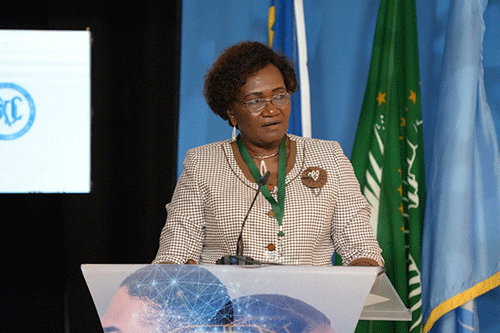Higher education minister Itah Kandji-Murangi read the Namibia University of Science and Technology’s governing council the riot act.
The minister, upon arrival in Windhoek from the north on Friday, convened a special urgent meeting with NUST council chair, banker Florrete Nakusera and her deputy, Michael Humavindu.
But after learning through a New Era report that a meeting held the previous day to deal with different allegations of impropriety had fallen flat, the minister saw it fit to call a full-blown council meeting, based on the sour twist things have taken at the university.
Kandjii-Murangi’s meeting was attended by nine council members, five of whom were external members of the body.
There were, however, two noticeable absentees in the form of NUST vice chancellor Erold Naomab and registrar Sifiso Nyathi.
According to people familiar with the meeting, Kandjii-Murangi did not take their absence lightly.
The politician stated that she called both Naomab and Nyathi to inform them about the urgent assembly.
They, however, informed her that they could not make it due to prior commitments.
“None of them knew that I was going to call the meeting for the chair and deputy. Therefore, it was an unfortunate, short notice. I will not say they refused [to attend]; they didn’t know,” Kandjii-Murangi said, dismissing assertions that the two simply elected to stay away in protest.
At the meeting, the minister was briefed on the alleged nepotism claims, a lack of accountability for public funds, abuse of the country’s labour laws and power by management, as reported by the media.
Her meeting with the council comes a month after the Namibia Public Workers Union (Napwu) called for her intervention.
“We are listening to one another. This thing is not out of hand. Council will deal with it,” a candid Kandjii-Murangi said.
However, an insider who preferred anonymity said the former University of Namibia dean of students has already made up her mind.
“The minister is rumoured to have called for an external forensic audit investigation, as these are no longer rumours but allegations which need thorough investigations,” said a person briefed on the meeting.
When this was put to the minister over the weekend, she retorted: “If an investigation will follow, they [council] will decide. It is not my call to make. We must wait for the council to pronounce. We’re all on the same wavelength. That is the prerogative of the council, and it is delving into the issues,” she stated.
The NUST council will meet again this week to finalise its position and map the way forward.
Sources briefed on the issue said the council was divided on whether or not the NUST management should spearhead an investigation implicating members of the executive.
But due to Nakusera’s refusal to have management excused from the discussions involving them, council members walked out then, and vowed to request Kandjii-Murangi to intervene as “the university’s governance has collapsed,” said a source close to the council.
This has come to pass.
Now, Kandjii-Murangi is adamant the situation remains under control.
“There seems to be an agenda to see the collapse of NUST. How can it happen with the kind of competent council members they have? These people found the institution riddled with issues, in a terrible state, but stabilised it. If there is a mess now, they will stabilise it. Let us give them a chance. Why should I act so soon and fast?” the minister wanted to know.
In the latest edition of NUST Brief, the university’s internal newsletter, spokesperson Johannes Haufiku, addressed the rumours.
When he was quizzed on an anonymous letter making the rounds in the public space, he said some of the issues raised by the letter have been taken up by management.
“There are issues raised that management deems relevant and require urgent attention. But there are also issues raised of a more personal nature that management vehemently refutes. One of the issues that management acknowledges as critical concerns some staff who are retained on short-term contracts for several years. This is not a fair labour practice, and seems to have been the norm at NUST before the current management took office. Management does not dispute that it is their responsibility to resolve this matter. However, resolving this in the best interest of all parties will not be an easy feat, as moving staff from contract to permanent employment requires a careful assessment of the financial implications of such an action,” Haufiku is quoted as saying.
He continued: “Depending on the number of people employed on short-term contracts, a balance will have to be found, for example, between affordability and the strategic relevance of the positions. Another undisputed issue is the job grading exercise which was initiated in 2019. Management views the finalisation and implementation of this exercise as critical, and resolved to address this in earnest.”
Chaos
Over the past few weeks, NUST has been embroiled in allegations of nepotism, a lack of accountability for taxpayers’ monies, wanton disregard to the country’s labour laws, and a management that is a power unto itself.
Last week, New Era reported that Napwu was against a NUST council decision to allow the university’s management – accused of committing wrongdoings – to investigate themselves.
Among the allegations is the alleged delayed job grading process dating back to 2019, a process the union claims was done in secrecy with no stakeholder engagement, which is a serious contravention of the Labour Act, NUST HR policy code and governance principles.
NUST has seemingly also failed to account for public monies entrusted to it since 2018.
Out of the N$500 million budget allocated to NUST, approximately 70% goes into salaries.
This translates into NUST spending about N$350 million on salaries and related expenditures.
– emumbuu@nepc.com.na



